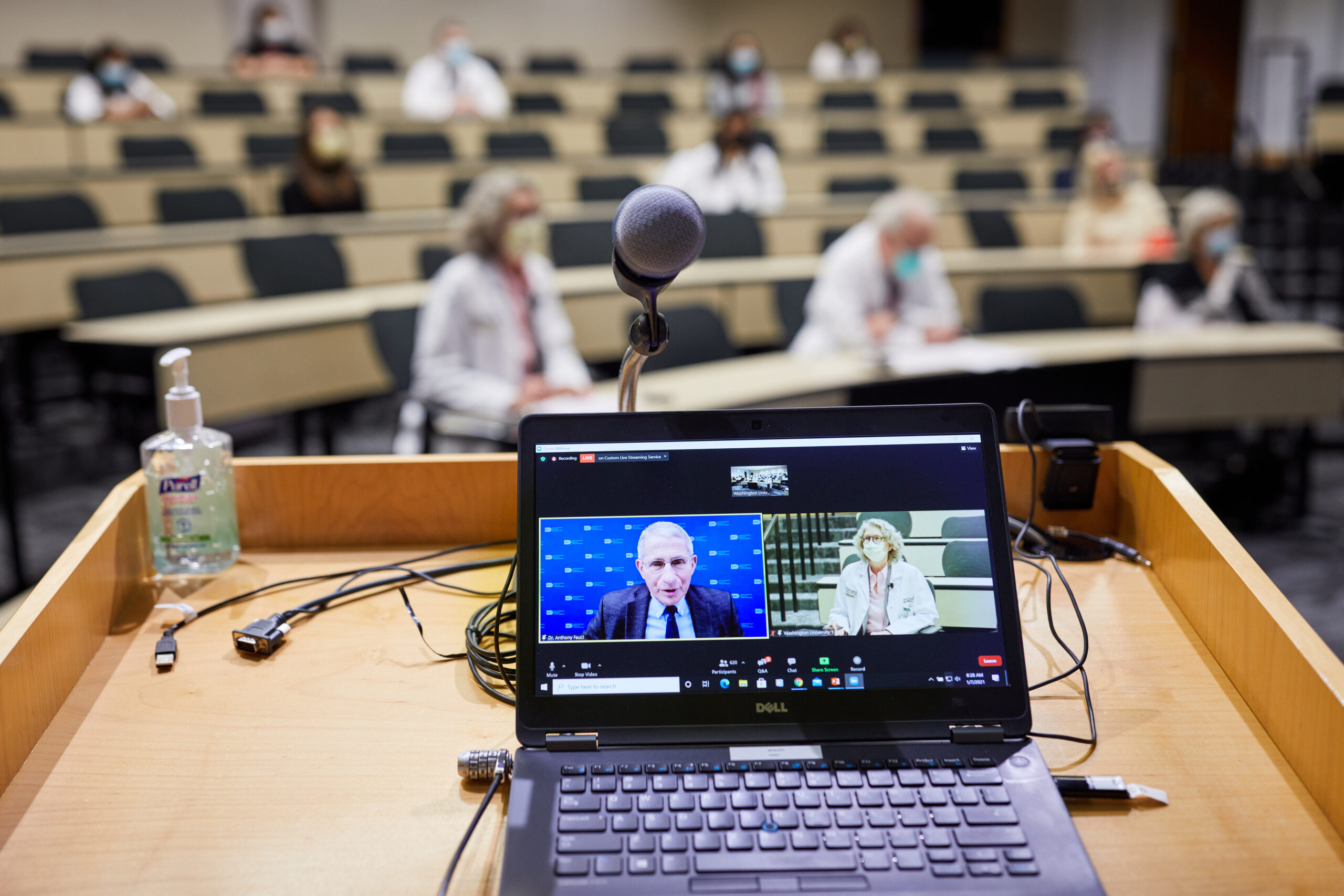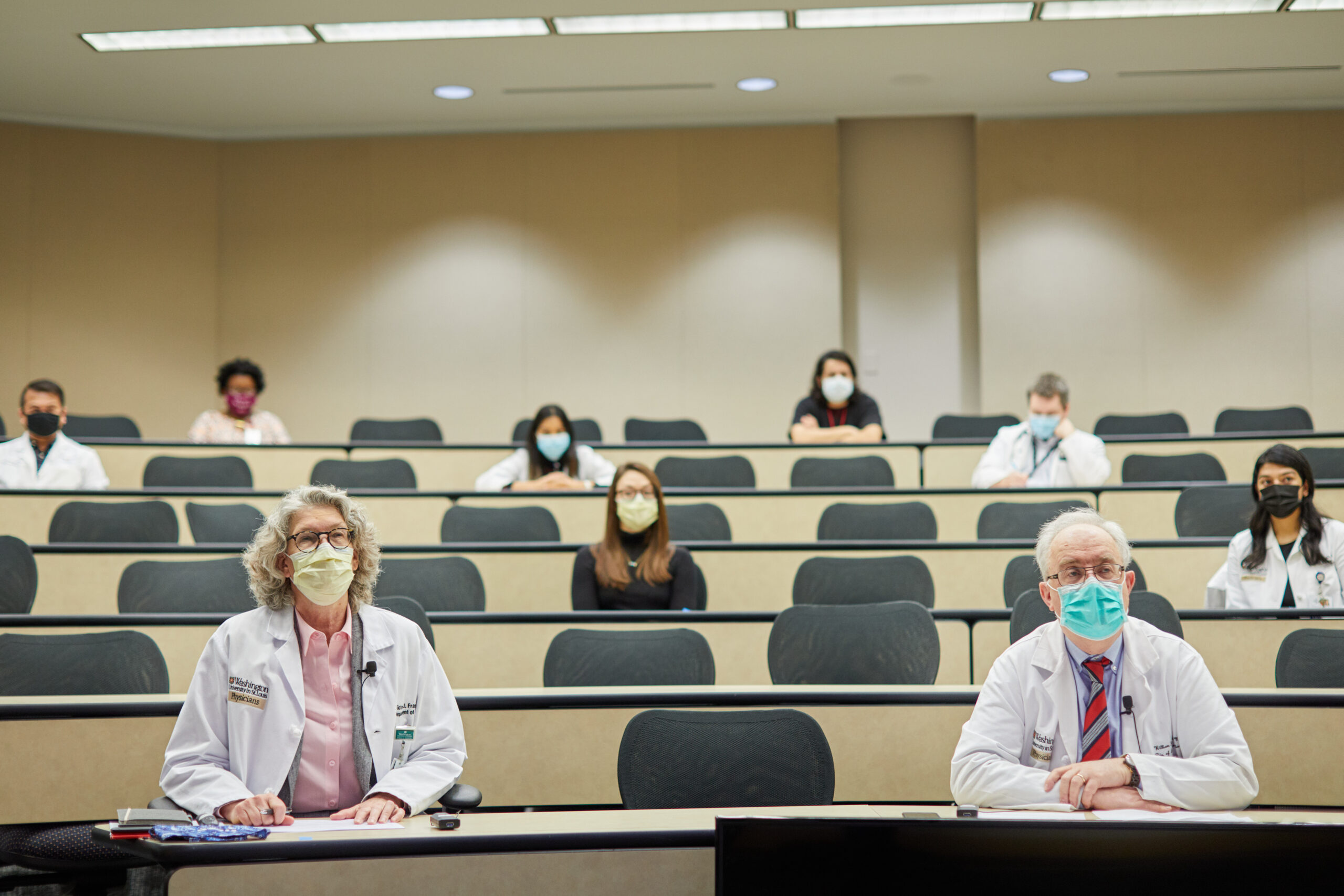Fauci gives COVID-19 update to School of Medicine faculty, staff, students
Virtual talk also open to general public
Anthony Fauci, MD, director of the National Institute of Allergy and Infectious Diseases of the National Institutes of Health (NIH), talked online Thursday, Jan. 7, with the Washington University Medical Campus community about the state of the COVID-19 pandemic. The talk, part of Washington University Department of Medicine’s virtual, weekly Grand Rounds, also was available online to the public.
Anthony Fauci, MD, director of the National Institute of Allergy and Infectious Diseases of the National Institutes of Health (NIH), spoke Thursday, Jan. 7, about the state of the COVID-19 pandemic as part of Washington University Department of Medicine’s virtual, weekly Grand Rounds.
The online talk — part of the Gerald Medoff Visiting Professor Grand Rounds lecture series — was free and open to the general public but geared toward Washington University and BJC HealthCare employees, residents, fellows and students.
As part of his remarks titled “Insights into the COVID-19 Pandemic,” Fauci answered questions about many aspects of the outbreak. He highlighted the extreme difficulty of the current situation across the country but also emphasized the hope spurred by the ongoing distribution of effective vaccines.
“Having been gripped by this pandemic for close to a year, the numbers of cases and deaths are so extraordinary that we’ve almost become numb to them,” Fauci said. “On the other side of the coin, there is light at the end of the tunnel with regard to vaccinations. As we move into April, if we get 100 million people vaccinated in 100 days, the way President-elect Biden wants to do, I think we’ll start to see some impact on the dynamics of the outbreak.”
 Matt Miller
Matt MillerFauci also addressed the concerns of those who may be hesitant to receive a new vaccine.
“As scientists, we follow the evidence and the data,” he said. “The safety record has been really quite good, comparable to any other safety record. As we’ve given these vaccines to over 4 million individuals, there have been 21 documented cases of severe allergic reactions. Even these adverse events are easily manageable. When we talk to our patients who are considering vaccination, we should present them with these facts. We should not criticize people who are hesitant, but reach out and say we understand why you might be hesitant. And take the time to explain in clear language the risks versus the benefits.”
He discussed the idea of herd immunity and the fact that even vaccinated people will need to continue wearing masks and social distancing until herd immunity is achieved.
“What we don’t know yet is whether these vaccines that protect against clinically recognizable disease also protect against asymptomatic infection,” he said. “It is conceivable that a vaccinated person could be protected from being ill but still have replicating virus in their nasopharynx. You don’t want to be protected yourself yet spread it to someone else, which is a very good reason to continue wearing a mask.”
Fauci estimated that about 70% to 85% of the population will need to be vaccinated to achieve herd immunity, in which enough people would be immune to the disease that it would stop spreading through the population.
In efforts to prepare for the next pandemic, Fauci said it will be vital to focus on building up local public health infrastructures and to encourage people to enter what he considers an extremely rewarding field.
“In some ways, we’ve been a victim of our successes,” he said. “Back when we had, for example, tuberculosis in every community, we had a public health infrastructure at the local level that was very sound and well-funded. Then, we started to pull back on that because we were so successful with vaccines and the availability of antibiotics and antivirals. Now, we need to get back to a local public health capability that is able to respond to any outbreak. Public health initiatives don’t work unless they’re implemented at the local level.
“If public health work suits you, I can’t imagine a more exciting thing for a young person to get involved in,” he said. “The impact that you can have on society is enormous.”
Moderating the discussion were Washington University’s Victoria Fraser, MD, the Adolphus Busch Professor and head of the Department of Medicine, and William Powderly, MD, the J. William Campbell Professor of Medicine, co-director of the Division of Infectious Diseases, assistant dean for clinical and translational research, the Larry J. Shapiro Director of the Institute for Public Health, and director of the Institute for Clinical and Translational Sciences.
“Dr. Fauci, I want to thank you,” Fraser said in closing remarks. “You have been an incredible inspiration to all of us throughout the year.”
During moments when health-care personnel have felt overwhelmed, she said, “we thought back to what Dr. Fauci would do and how you stay so calm despite all the challenges, and continue to be forward-thinking, data-driven and pushing the science to protect the public. I want to thank you for your incredible leadership and energy.”
A recording of the presentation is available on YouTube (or above). For more information on Grand Rounds, visit the Department of Medicine website.
 Matt Miller
Matt Miller





